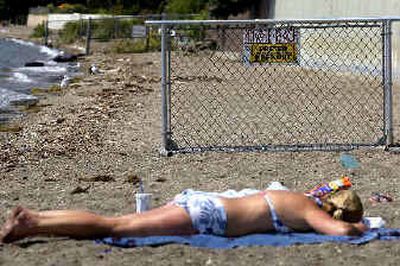Court asked to force removal of beach barrier

The city of Coeur d’Alene is going to court to force an East Lakeshore Drive property owner to remove a makeshift barricade restricting access to a popular stretch of beach.
Jerry Frank has repeatedly refused the city’s requests that he move a bicycle rack and section of chain-link fence stretching from the seawall in front of his home toward the water’s edge at Sanders Beach. The fence bears a sign that reads: “Private Beach. No Trespassing. Keep Out.”
Attorney Michael Haman, representing the city, said the fence and bicycle rack violate the city’s shoreline ordinance, which prohibits structures south of East Lakeshore Drive between 12th and 15th streets.
Frank said he hadn’t seen the complaint the city filed and declined comment Friday. Haman said Frank has 20 days to respond once he’s served with the complaint. If he doesn’t remove the barricades, Haman said the court will be asked to find the Franks in violation of city code and force removal of the bike rack and fence.
For years, ownership of the stretch of beach along East Lakeshore Drive has been disputed, resulting in clashes between property owners and beachgoers. Some property owners have placed no trespassing signs to discourage people from using the section of beach. One has even gone as far as erecting a permanent fence.
In the case of the fence, the city took homeowner Jack Simpson to court and prevailed. The court’s decision has been stayed, though, pending an October appeal.
Property at both ends of the disputed beach is city-owned.
David Moseley has lived in the neighborhood since the early 1960s and uses the beach almost daily during the warm summer months.
“The beach has been public since longer than there were houses down there,” he said.
When people began building homes by the beach, Moseley said, they generally shared the space with the public. But as ownership changed and the beach became more popular, Moseley said property owners “decided they didn’t want the traffic and crowds there.”
Moseley and other members of the Sanders Beach Preservation Association are asking the city, county and Idaho State Land Board to determine the ordinary high-water mark. That would show where private property ends and public ownership begins.
“It’s public and we need to prove it,” Moseley said.
Roger Johnson, also with the grass-roots organization, said he feels the city has been patient with the Franks.
At least twice since last August, the city has formally requested removal of the barricades.
“If nobody knows what’s private and what’s public, how can you say who’s trespassing?” Johnson said. “The fences and signs are really inappropriate at this time.”
City Attorney Mike Gridley said the injunction is an issue of code violation, not one of who owns the beach. He said it’s no different than the city’s procedure for dealing with a junk car in a resident’s front yard.
“The city is in the middle of a dispute which is separate from this fence issue,” Gridley said. “That’s a dispute regarding who owns what down there and who has a right to go on what part of the beach.
“One side is asking us to arrest people and prosecute them for trespassing. Another side is saying, ‘You can’t prove they own this beach. It’s public and if you arrest us, we will sue you.’ “
Last weekend, Mayor Sandi Bloem was swimming in front of her brother’s Sanders Beach home when neighboring property owners and beachgoers started arguing. Police were called and the mayor found herself trying to mediate the situation.
Bloem said the city and landowners are exploring several proposals to address concerns about Sanders Beach. Some proposals include exchanging public use of the beach for city services like policing the beach. Parking alternatives also are being considered.
“It’s important to realize that the city is in a position to protect property rights, both private property rights and public property rights,” Bloem said. “We just need to know what property belongs to who in order to offer that protection.”